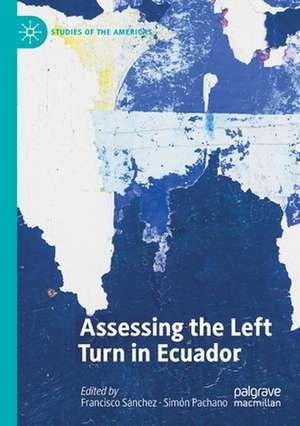Assessing the Left Turn in Ecuador: Studies of the Americas
Editat de Francisco Sánchez, Simón Pachanoen Limba Engleză Paperback – 17 ian 2021
| Toate formatele și edițiile | Preț | Express |
|---|---|---|
| Paperback (1) | 586.23 lei 6-8 săpt. | |
| Springer International Publishing – 17 ian 2021 | 586.23 lei 6-8 săpt. | |
| Hardback (1) | 740.11 lei 6-8 săpt. | |
| Springer International Publishing – 18 dec 2019 | 740.11 lei 6-8 săpt. |
Din seria Studies of the Americas
- 15%
 Preț: 708.83 lei
Preț: 708.83 lei - 20%
 Preț: 566.72 lei
Preț: 566.72 lei -
 Preț: 357.57 lei
Preț: 357.57 lei -
 Preț: 300.85 lei
Preț: 300.85 lei -
 Preț: 303.28 lei
Preț: 303.28 lei -
 Preț: 305.50 lei
Preț: 305.50 lei -
 Preț: 308.36 lei
Preț: 308.36 lei -
 Preț: 312.10 lei
Preț: 312.10 lei -
 Preț: 298.66 lei
Preț: 298.66 lei -
 Preț: 389.70 lei
Preț: 389.70 lei -
 Preț: 394.12 lei
Preț: 394.12 lei -
 Preț: 388.72 lei
Preț: 388.72 lei -
 Preț: 388.72 lei
Preț: 388.72 lei -
 Preț: 388.72 lei
Preț: 388.72 lei -
 Preț: 389.31 lei
Preț: 389.31 lei -
 Preț: 389.70 lei
Preț: 389.70 lei - 15%
 Preț: 697.65 lei
Preț: 697.65 lei -
 Preț: 392.60 lei
Preț: 392.60 lei -
 Preț: 384.31 lei
Preț: 384.31 lei - 18%
 Preț: 736.81 lei
Preț: 736.81 lei -
 Preț: 390.25 lei
Preț: 390.25 lei -
 Preț: 394.51 lei
Preț: 394.51 lei - 18%
 Preț: 782.52 lei
Preț: 782.52 lei -
 Preț: 393.74 lei
Preț: 393.74 lei -
 Preț: 388.72 lei
Preț: 388.72 lei -
 Preț: 391.61 lei
Preț: 391.61 lei -
 Preț: 382.57 lei
Preț: 382.57 lei -
 Preț: 391.40 lei
Preț: 391.40 lei -
 Preț: 390.08 lei
Preț: 390.08 lei -
 Preț: 388.72 lei
Preț: 388.72 lei - 15%
 Preț: 642.36 lei
Preț: 642.36 lei -
 Preț: 392.75 lei
Preț: 392.75 lei - 15%
 Preț: 503.37 lei
Preț: 503.37 lei -
 Preț: 392.37 lei
Preț: 392.37 lei - 15%
 Preț: 638.43 lei
Preț: 638.43 lei -
 Preț: 388.72 lei
Preț: 388.72 lei -
 Preț: 383.71 lei
Preț: 383.71 lei - 15%
 Preț: 635.65 lei
Preț: 635.65 lei -
 Preț: 388.52 lei
Preț: 388.52 lei -
 Preț: 386.81 lei
Preț: 386.81 lei -
 Preț: 387.75 lei
Preț: 387.75 lei -
 Preț: 392.60 lei
Preț: 392.60 lei -
 Preț: 388.72 lei
Preț: 388.72 lei -
 Preț: 388.72 lei
Preț: 388.72 lei
Preț: 586.23 lei
Preț vechi: 689.68 lei
-15% Nou
Puncte Express: 879
Preț estimativ în valută:
112.17€ • 117.12$ • 92.84£
112.17€ • 117.12$ • 92.84£
Carte tipărită la comandă
Livrare economică 05-19 aprilie
Preluare comenzi: 021 569.72.76
Specificații
ISBN-13: 9783030276270
ISBN-10: 3030276279
Pagini: 373
Ilustrații: XXX, 373 p. 51 illus., 45 illus. in color.
Dimensiuni: 148 x 210 mm
Greutate: 0.48 kg
Ediția:1st ed. 2020
Editura: Springer International Publishing
Colecția Palgrave Macmillan
Seria Studies of the Americas
Locul publicării:Cham, Switzerland
ISBN-10: 3030276279
Pagini: 373
Ilustrații: XXX, 373 p. 51 illus., 45 illus. in color.
Dimensiuni: 148 x 210 mm
Greutate: 0.48 kg
Ediția:1st ed. 2020
Editura: Springer International Publishing
Colecția Palgrave Macmillan
Seria Studies of the Americas
Locul publicării:Cham, Switzerland
Cuprins
Chapter 1 Introduction.- Chapter 2 Reshaping the State: The Unitary Executive Presidency of Rafael Correa.- Chapter 3 “La patria ya es de todos:” Pilgrimages, Charisma, Territory, and the Return of the State.- Chapter 4 State-organized crime: An hypothesis on the institutionalization of corruption during the Revolución Ciudadana.- Chapter 5 Rafael Correa’s Technopopulism in Comparative Perspective.- Chapter 6 A revolution with a female face? Gender debates and policies during Rafael Correa’s government.- Chapter 7 Intellectuals, NGOs, and Social Movements under the Correa Regime: Collaborations and Estrangements.- Chapter 8 The Macroeconomics of the Commodities Boom in Ecuador: A Comparative Perspective.- Chapter 9 Understanding Ecuador’s Growth Prospects in the Aftermath of the Citizens’ Revolution.- Chapter 10 The political management of the oil bonanza during Correa’s government.- Chapter 11 Buen Vivir: a reference for public policies and development in Ecuador and the governments of the Latin American left.- Chapter 12 Educational Policy in Ecuador during the Citizens’ Revolution.- Chapter 13 Far from becoming the Jaguar of Latin America: The Ecuadorian Science, Technology and Innovation Policy Turn.- Chapter 14 Rafael Correa’s foreign policy paradox: discursive sovereignty, practical dependency.- Chapter 15 Conclusions: Assessing the Left Turn in Latin America – 10 years of the Correa Administration in Ecuador.
Notă biografică
Francisco Sánchez is Director of the Instituto de Iberoamérica and Associate Professor of Political Science, Universidad de Salamanca, Spain.
Simón Pachano is Professor-Researcher of Political Science at FLACSO Ecuador, Ecuador.
Textul de pe ultima copertă
This book examines the “left turn” in Latin American politics, specifically through the lens of Ecuador and the effects of the Citizens’ Revolution’s actions and public policies on relevant actors and institutions. Through a comprehensive analysis of one country’s turn to the left and the outcomes generated by that process, the authors and editors provide a clearer understanding of the ways in which the popular desire for change (predominant through the region in recent times, as a response to late-twentieth-century neoliberalism) was realized—or not. The particular case of Ecuador further potentiates analysis of the entire region-wide process, considering that the “corrector” cycle is now at an end, and that the economic and international conditions that favored the return of left governments have also changed.
Francisco Sánchez is Director of the Instituto de Iberoamérica and Associate Professor of Political Science, Universidad de Salamanca, Spain.
Simón Pachano is Professor-Researcher of Political Science at FLACSO Ecuador, Ecuador.
Caracteristici
Acts as the first text published in English to assess the Latin American left turn with Ecuador as the main reference Analyzes the political action as a whole, including social, economic and political elements from institutional and public policies perspectives Provides a clearer understanding of the ways in which the popular desire for change (predominant through the region in recent times, as a response to late-20th century neoliberalism) was realized – or not
